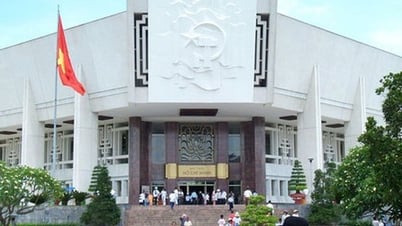The role of calories in human life
Calories are a unit used to calculate the energy that the body takes in from food and expends from daily physical activities. Energy helps maintain life and body activities. Even when lying down to sleep, the body is consuming energy. The more the body is active, the more effort is used such as exercise, manual labor... the more energy is consumed. If we do not have energy, the body cannot continue to function to ensure life.
If there is excess energy, meaning the amount of calories consumed is greater than the amount consumed, it will be converted into fat and accumulated in the body. Long-term fat accumulation is one of the causes of many dangerous chronic diseases such as high blood pressure, high cholesterol, cardiovascular disease, diabetes, bone and joint diseases...

Calories in each food.
However, if the body is constantly lacking energy, meaning the amount of calories consumed is less than the amount the body needs to perform daily activities, it can also lead to many dangerous consequences. Lack of energy for a long time will lead to fatigue, lethargy, stress, lack of concentration, irritability, etc.
A low-calorie diet also leads to a lack of iron, folate, vitamins, etc. When lacking energy, the body is forced to take reserves from muscles and fat tissue to compensate. As a result, the body becomes weak, debilitated, and has poor resistance.
Therefore, if the body receives just enough energy each day, it will function well. If it receives too little or too much energy, it will have a big impact on health.
How many calories does a person need per day?
Daily calorie intake depends on each person's gender, age, weight, height, physical activity level... But in adults, a healthy female needs about 2,000 calories/day to maintain weight and ensure basic activities.
Men have a faster metabolism, consume more energy, and weigh more, so they need about 2,500 calories/day.
If a person is physically active, he or she will need more energy. Thus, depending on daily activities, we will calculate the amount of calories needed to maintain life and activities.
In addition, the uses of calories are also different in food groups. For example, calories in protein help build and maintain muscle... Calories from fiber help you feel full longer, reducing cravings. The calorie content of each nutrient is as follows:
1 gram of starch = 4 calories.
1 gram of protein = 4 calories,
1 gram of fat = 9 calories.
As mentioned above, the specific energy needs of each person are different, depending on many factors. However, you can apply the Mifflin – St Jeor formula to calculate the amount of calories you need as follows:
Women: Calorie needs = 6.25 x height (cm) + 10 x weight (kg) – 5 x age – 161.
Men: Calorie needs = 6.25 x height (cm) + 10 x weight (kg) – 5 x age + 5.
For example:
For a 25-year-old woman, 160cm tall and 60kg in weight, the daily calorie intake is calculated as follows: (6.25 x 160) + (10 x 60) – (5 x 25) – 161 = 1,314 calories.
For a 25 year old male, 180cm tall, 80kg in weight, the daily calorie intake is calculated as follows: (6.25 x 180) + (10 x 80) – (5 x 25) + 5 = 1805 calories.
How many calories should I eat a day to lose weight?
Based on the average calorie needs mentioned above, men aged 26 - 45 need about 2,500 calories/day. If they want to lose 0.5kg/week, they need to consume about 2,000 calories/day. If they exercise regularly, they need to consume about 2,300 calories/day to lose weight but still ensure that daily activities are not affected.
For women aged 26 - 45, they need to consume an average of 2,000 calories/day. If they want to lose 0.5kg/week, they only need to consume about 1,500 calories. This calculation is not suitable for pregnant or breastfeeding women.

Avoid foods that are high in calories but low in protein and fiber.
Specifically, how to cut calories in each meal to lose weight scientifically , without affecting other body functions, is as follows:
Breakfast:
- Rich in protein to reduce hunger, provide enough energy to build muscle. A diet rich in protein will promote energy metabolism, maintain muscle in the body. The more muscle, the more calories are burned. Meats such as chicken breast, lean pork/beef, seafood are rich in protein but low in calories will help you stay full longer and not accumulate fat under the skin.
- Eating foods rich in fiber helps you feel full longer and reduces cravings.
- Eat starch to have enough energy for the brain to function well, but need to limit because if there is excess, the body will feel sleepy and have difficulty concentrating.
You should eat foods of plant origin such as green vegetables (spinach, kale, cabbage...), tubers (radish, tomato, bell pepper, cucumber...) and fruits (apples, strawberries, papaya...). These foods are low in calories but high in fiber, vitamins and minerals that are good for your health and help you feel full for a long time.
- Eat less fat, limit sugar and salt.
Lunch:
You should eat a full range of foods like breakfast, adding healthy fats and low calories will provide a lot of nutrients for the body without gaining weight.
Foods such as fatty fish (salmon, tuna...), seafood (clams, oysters, shrimp), nuts (walnuts, cashews, chia seeds...) are rich in protein, omega-3 fatty acids, vitamins... good for health, help reduce fat, lose weight, reduce bad cholesterol...
Dinner:
Should eat before 7pm, limit starch, fat and reduce protein intake. Increase vegetables high in fiber, especially soluble fiber.
Source SKDS
Source






































































































Comment (0)